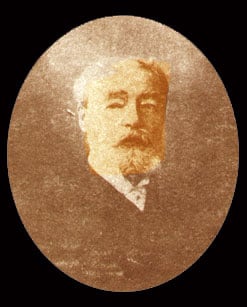Max Arthur MacAuliffe: The Irish Luminary Who Bridged East and West
Max Arthur MacAuliffe: The Irish Luminary Who Bridged East and West
Early Life in the Emerald Isle
Born as Michael McAuliffe on 11 September 1838 in Glenmore, Monagea near Newcastle West, County Limerick, Max Arthur MacAuliffe hailed from a place deeply rooted in Irish tradition and history. The McAuliffe family’s journey began in Monagea, but by the time young Michael was eight, they relocated to Templeglantine, driven by his father’s new position as the headmaster of the national school. The entire McAuliffe family resided in the very premises of this school, right above the classrooms.
These early years in Ireland played an instrumental role in moulding Michael’s educational and intellectual pursuits. The lush landscapes of Ireland, coupled with the depth of education he received, helped Michael foster a love for languages and history. His educational trajectory saw him join Springfield College, Ennis, in County Clare and later Queen’s College in Galway in 1857. Here, he not only excelled academically, winning scholarships and medals, but also contributed to the college’s Literary and Debating Society.
Venturing to the Indian Subcontinent
Upon successfully passing the Indian Civil Service examination in London in June 1862, Michael’s journey shifted from the rugged terrains of Ireland to the intricate socio-cultural landscapes of India. His initial appointment was in Bengal, but destiny had something else in store, leading him to the heartland of the Sikh community – the Punjab, in 1864.
Michael’s ascent in the administrative world of India was rapid. His roles evolved from being an Assistant Commissioner and Judicial Assistant to the esteemed position of a Deputy Commissioner. By November 1884, he had become a Divisional Judge, a testament to his administrative acumen and dedication.
An Irishman’s Fascination with Sikhism
While Michael’s official duties kept him occupied, it was the mystique of the Sikh religion that truly captivated his heart. Punjab, being the birthplace of Sikhism, offered him ample opportunities to delve deep into its sacred scriptures and profound teachings.
He recognized the universality and depth of Sikh teachings and believed in the importance of making these accessible to the western world. Despite the magnitude of the task, given the linguistic diversity of the Sikh scriptures, Michael’s determination was unwavering. He found a scholarly ally in Pratap Singh Giani, and together they embarked on the colossal task of translating the Sikh scriptures.
Triumphs and Tribulations of a Scholar
The pinnacle of Michael’s scholarly endeavours came with the publication of his magnum opus, ‘The Sikh Religion: Its Gurus, Sacred Writings and Authors’ in 1909 by the Oxford University Press. This exhaustive work, spanning six volumes and close to 2,500 pages, was a labour of love and an offering to the Sikh community and the world.
However, the path of scholarship wasn’t without its obstacles. The challenges he faced, particularly the lack of governmental and financial support, led to his decision to retire from the Civil Service in 1893. He moved to London in 1904, seeking solitude and an environment conducive to his work. However, his love and commitment to Sikhism remained steadfast, with many believing that he converted to Sikhism before his passing in 1913.
The Name’s MacAuliffe: Max Arthur MacAuliffe
As intriguing as his life’s journey was, Michael’s transition from Michael McAuliffe to Max Arthur MacAuliffe was an enigma in itself. While some opine that the name ‘Max’ was a tribute to Max Müller, the renowned scholar of Hindu religion whom Michael admired, the exact reasons remain shrouded in mystery. This change wasn’t merely superficial, as he formally informed the Government of India in 1909 about his name’s statutory declaration, ensuring its official adoption.
The Twilight Years in London
Post his significant contribution to Sikhism and its scriptures, Max Arthur MacAuliffe’s later life saw him settle in London, away from the hustle and bustle of Punjab and the intricacies of the Indian administration. This shift was marked not just by a change in geography but also by a transition in his personal and professional life.
While in London, he bought a residence that served as both his home and his sanctuary. Here, surrounded by the vast expanse of his works and memories, MacAuliffe continued his research and writings. While his monumental work on Sikhism had already been published, his scholarly fervour never waned. He continued to delve into the nuances of Sikh history, exploring facets that perhaps he hadn’t touched upon earlier.
The Struggles and the Solitude
Despite the acclaim ‘The Sikh Religion: Its Gurus, Sacred Writings and Authors’ received, MacAuliffe’s later years weren’t without challenges. The lack of support, both financial and moral, from the authorities he once served and the Sikh leadership he deeply admired, cast a shadow over his accomplishments. The emotional and financial toll of dedicating a lifetime to an expansive work like his, without adequate support, was palpable.
His letters and communications from this period hint at a sense of desolation and a yearning for the vibrant days he spent in Punjab. Nonetheless, he continued his work, driven by an undying passion and commitment to the cause he believed in.
An End that Resonates a Life’s Mission
In 1913, Max Arthur MacAuliffe’s journey came to an end. He succumbed to cancer, leaving behind an unmatched legacy. His passing wasn’t just a loss for the Sikh community, for whom he had become an ambassador of sorts, but also for the world of intercultural studies and religious scholarship.
While it is widely believed that MacAuliffe converted to Sikhism before his death, this aspect of his life remains enigmatic, much like many facets of his existence. Whether or not he formally embraced the faith, his deep respect and reverence for Sikhism were undeniable.
Max Arthur MacAuliffe: A Legacy Beyond Borders
MacAuliffe’s journey, from the verdant landscapes of Ireland to the spiritual heartland of Punjab, stands as a testament to the power of passion and dedication. His translations bridged cultures and generations, making the teachings of Sikh Gurus accessible to a global audience. In his death, the world lost not just a scholar and an administrator but a cultural ambassador who believed in the universality of human experiences, values, and beliefs.
Even today, as one walks through the bylanes of Punjab or the libraries of the world, Max Arthur MacAuliffe’s name resounds with respect and gratitude. His work remains an invaluable resource for scholars, spiritual seekers, and anyone interested in understanding the depth and diversity of Sikhism.
Legacy of Max Arthur MacAuliffe
Max Arthur MacAuliffe’s legacy is multifaceted. For the Sikh community, he remains a bridge between the East and West, providing access to their sacred scriptures in English. For Ireland, he stands as a shining example of how one of their own ventured far from home, immersed himself in a foreign culture, and contributed profoundly to world knowledge.

Did you find this helpful?
IrishHistory.com is a website that relies on community contributions to help make it better. If you have a suggestion to improve this page, or have spotted any errors, please click ‘Suggest an Edit’
